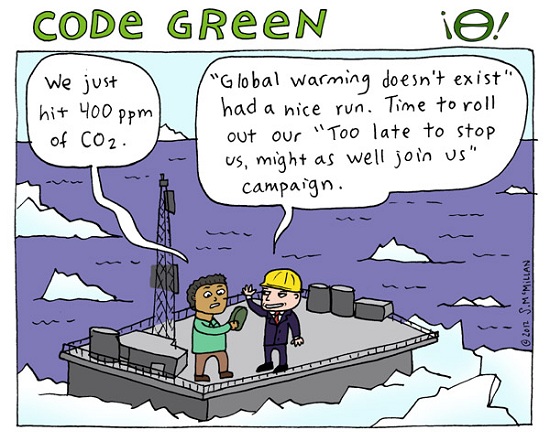2012 SkS Weekly Digest #25
Posted on 25 June 2012 by John Hartz
SkS Highlights
"The myth that Hansen's 1988 prediction was wrong is one of those zombie myths that always keeps coming back even after you chop its head off time and time again. The newest incarnation of this myth comes from Jan-Erik Solheim, who in a 272 word article promoted by Fritz Vahrenholt and Sebastian Lüning (translated by the usual climate denial enablers here) manages to make several simple errors which we will detail here."
So begins Simply Wrong: Jan-Erik Solheim on Hansen 1988, by SkS's most prolific myth-buster, Dana. As to be expected, this article has generated the most comments of the articles posted this past week.
Toon of the Week

"New Campaign"
Source: Stephanie McMillan, Code Green.
Quote of the Week
"The disconnect between politics and climate change is especially pronounced in America, where the fossil-fuel lobby is entrenched and aggressive, with a history of bending the facts and winning elections, and where one of the two major political parties has taken the shameful ostrich position that all the world’s climate scientists are simply wrong."
Source: "The planet still groans, not that we'd hear it", Commentary by James Lenfeskey, StarTribune (Minneapolis, MN), June 21, 2012.
Issue of the Week
Should SkS increase its coverage of the science of renewable energy?
Scientific Term of the Week
Albedo: The fraction of solar radiation reflected by a surface or object, often expressed as a percentage. Snow-covered surfaces have a high albedo, the surface albedo of soils ranges from high to low, and vegetation-covered surfaces and oceans have a low albedo. The Earth’s planetary albedo varies mainly through varying cloudiness, snow, ice, leaf area and land cover changes.
Albedo feedback:A climate feedback involving changes in the Earth’s albedo. It usually refers to changes in the cryosphere, which has an albedo much larger (~0.8) than the average planetary albedo (~0.3). In a warming climate, it is anticipated that the cryosphere would shrink, the Earth’s overall albedo would decrease and more solar radiation would be absorbed to warm the Earth still further.
Source: Annex I (Glossary) to Climate Change 2007: Working Group I: The Physical Science Basis, IPCC Fourth Assessment Report.
The Week in Review
A complete listing of the articles posted on SkS during the past week.
- Mercury rising: Greater L.A. to heat up an average 4 to 5 degrees by mid-century by Dana
- Review of new iBook: Going to Extremes by Baerbel W
- Ten Things I Learned in the Climate Lab by climatesight
- Christy Exaggerates the Model-Data Discrepancy by Dana
- Adding wind power saves CO2 by Mark R
- Arctic sea ice takes a first nosedive by Neven
- New research from last week 24/2012 by Ari Jokimäki
- Simply Wrong: Jan-Erik Solheim on Hansen 1988 by Dana
Coming Soon
A list of articles that are in the SkS pipeline. Most of these articles, but not necessarily all, will be posted during the week.
- Response to Vahrenholt and Luning (Bart Verheggen)
- New research from last week 25/2012 (Ari Jokimäki)
- Gleckler et al Confirm the Human Fingerprint in Ocean Warming (Dana)
- A Letter of Support from SkS to Phil Jones (Glenn Tramblyn)
- Michaels and Cato Unwittingly Accept the Climate Threat (Dana)
- Murry Salby's Correllation Condundrum, Part 1 (Dikran Marsupial)
- Murry Salby's Correllation Condundrum, Part 2 (Dikran Marsupial)
- Lindzen and Choi 2011 - Party Like It's 2009 (Dana)
SkS in the News
Dana's Simply Wrong: Jan-Erik Solheim on Hansen 1988 was re-posted on What's Up With That Watts?.
SkS Spotlights: World Resources Institute
The World Resources Institute (WRI) is a global environmental think tank that goes beyond research to put ideas into action.
We work with governments, companies, and civil society to build solutions to urgent environmental challenges. WRI’s transformative ideas protect the earth and promote development because sustainability is essential to meeting human needs and fulfilling human aspirations in the future.
WRI spurs progress by providing practical strategies for change and effective tools to implement them. We measure our success in the form of new policies, products, and practices that shift the ways governments work, companies operate, and people act.
We operate globally because today’s problems know no boundaries. We are avid communicators because people everywhere are inspired by ideas, empowered by knowledge, and moved to change by greater understanding. We provide innovative paths to a sustainable planet through work that is accurate, fair, and independent.































 Arguments
Arguments























 0
0  0
0






Comments